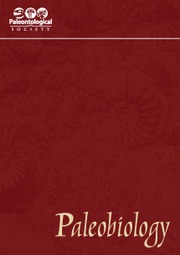Article contents
Climate-mediated changes in predator–prey interactions in the fossil record: a case study using shell-drilling gastropods from the Pleistocene Japan Sea
Published online by Cambridge University Press: 09 February 2016
Abstract
Paleoecological studies enhance our understanding of biotic responses to climate change because they consider long timescales not accessible through observational and experimental studies. Using predatory drillholes produced on fossil bivalve shells by carnivorous gastropods, we provide an example of how climate change affected predator–prey interactions. We quantitatively examine temporal changes in fossil molluscan assemblages and predation patterns from the Pleistocene Japan Sea, which experienced drastic environmental changes in relation to glacial–interglacial climate cycles. We found significant changes in predation patterns associated with a decline in the abundance of warm-water molluscan species. Climate-mediated fluctuations in the eustatic sea level and resultant weakening of the Tsushima Warm Current caused a decline in a warm-water shell-drilling predator, which moderated the predation pressure and size relationship between the predators and the bivalve prey. Our results indicate that climate-mediated range shifts of species in present-day and future marine ecosystems can likewise increase altered predator–prey interactions.
- Type
- Articles
- Information
- Copyright
- Copyright © 2016 The Paleontological Society. All rights reserved
References
Literature Cited
- 8
- Cited by


